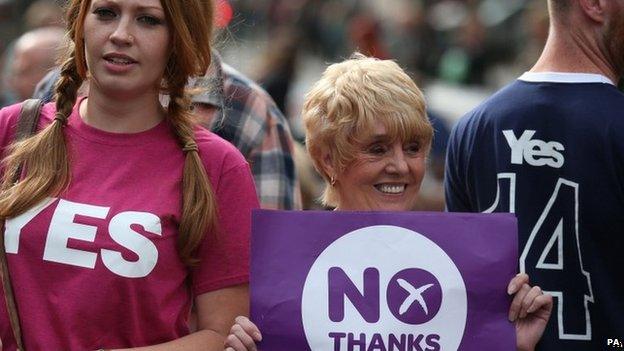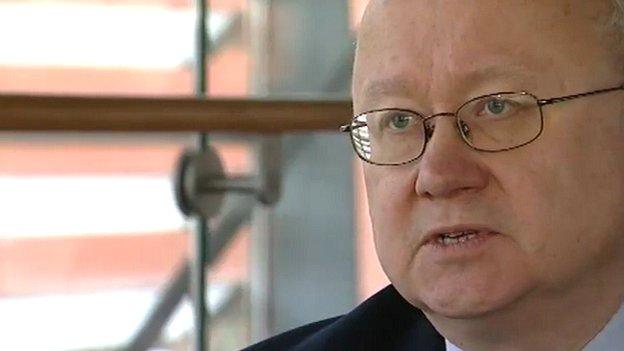'Radical' change after referendum, Andrews predicts
- Published

A post-referendum future for Wales was discussed at the conference in Cardiff
The new Welsh public services minister has said he expects "radical" UK constitutional change regardless of the Scottish referendum's outcome.
Leighton Andrews told the BBC the vote would have "major implications" whether Scotland remained in the UK or not.
Mr Andrews was speaking at a conference considering the referendum's implications for Wales.
Plaid Cymru leader Leanne Wood said it was time for Wales to re-negotiate its relationship with the rest of the UK.
Mr Andrews rejoined the cabinet on Thursday, to lead planned major changes to local councils.
He resigned 15 months ago after campaigning to keep a school open in his own constituency, against his own guidelines as the then education education minister.
The Institute of Welsh Affairs conference at the Wales Millennium Centre involved politicians and constitutional experts and came as recent polls suggested the Yes and No camps were neck-and-neck.
Mr Andrews, the AM for Rhondda, said issues such as the role of the House of Lords would have to be addressed, as a result of next Thursday's result.
"I think it will have major implications for the UK regardless of the result of the referendum," he said.
"I have no doubt we are now going to see radical constitutional reform in the UK, regardless of the result next week.
"It's not just about the powers open to Wales.
"I think it's also about what makes a new Union, what's the structure of representation across the UK, what are the powers of the House of Lords?
"Is it not time for a second chamber in the UK that reflects the nations and regions of the UK?
"What happens for England? There are a whole series of questions that will have to be addressed."
First Minister Carwyn Jones has called for a constitutional convention after the referendum to look again at the way the nations of the UK are governed.

Leighton Andrews believes it is time to change the way the UK is run
But the economist and former Welsh government advisor, Prof Gerry Holtham, told the conference the outcome of the vote would not lead to such a process.
He said Wales and Northern Ireland do not know what they would want from the convention, and the current political set-up suits the "British establishment".
However Ms Wood said the build-up to the 18 September referendum had been inspiring, seeming to be a "rebirth almost of democracy".
"People are involved, it's a mass movement, people are well-informed, they're engaged," she said.
"And regardless of what the result is on September 18 something very special has happened.
"And I think we can replicate that here in Wales too when we go to the people and ask them about the kind of settlement that they want to see.
"There's a consensus that the settlement we have is not fit for purpose and Scotland opens up opportunities for us on that front."
Prof Roger Scully, of Cardiff University's Wales Governance Centre, said it was remarkable that the Yes and No sides were so close, according to the polls, a week before the vote.
He said there were three reasons why he expected the No vote to be ahead next Thursday.
Firstly, he said, the No campaigners were more numerous and more powerful, the pro-Union side started with a much larger advantage in the opinion polls and, thirdly, research suggested constitutional referendums tended to be strongly biased towards the status quo.
'Change everything'
Prof Scully added that he would put his money on the No campaign pulling through, if he was forced to call the result, but "not with a lot of confidence".
He said the Yes supporters could still win, as their campaign had been so strong on the ground.
Prof Laura McAllister, of Liverpool University, told the conference she thought the No campaign had "shot itself in the foot" by refusing to put a "devo max" option on the referendum ballot.
She accused the pro-Union lobby of tactically making "one mistake after another".
BBC Wales Welsh affairs editor Vaughan Roderick said the most important part of the referendum process had already taken place, and that was the recognition Scotland could consider voting Yes.
"That will change everything," he said, predicting that it would lead to "the most interesting period in memory".